
Graham Chapman was a British actor, comedian and writer. He was one of the six members of the surreal comedy group Monty Python. He portrayed authority figures such as The Colonel and the lead role in two Python films, Monty Python and the Holy Grail (1975) and Life of Brian (1979).

John Marwood Cleese is an English actor, comedian, screenwriter, and producer. Emerging from the Cambridge Footlights in the 1960s, he first achieved success at the Edinburgh Festival Fringe and as a scriptwriter and performer on The Frost Report. In the late 1960s, he cofounded Monty Python, the comedy troupe responsible for the sketch show Monty Python's Flying Circus. Along with his Python costars Terry Gilliam, Eric Idle, Terry Jones, Michael Palin, and Graham Chapman, Cleese starred in Monty Python films, which include Monty Python and the Holy Grail (1975), Life of Brian (1979), and The Meaning of Life (1983).
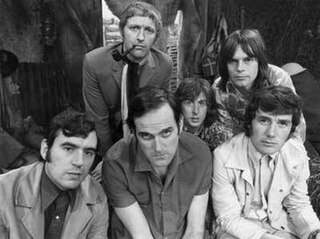
Monty Python were a British comedy troupe formed in 1969 consisting of Graham Chapman, John Cleese, Terry Gilliam, Eric Idle, Terry Jones, and Michael Palin. The group came to prominence for the sketch comedy series Monty Python's Flying Circus, which aired on the BBC from 1969 to 1974. Their work then developed into a larger collection that included live shows, films, albums, books, and musicals; their influence on comedy has been compared to the Beatles' influence on music. Their sketch show has been called "an important moment in the evolution of television comedy".

The "Dead Parrot Sketch", alternatively and originally known as the "Pet Shop Sketch" or "Parrot Sketch", is a sketch from Monty Python's Flying Circus about a non-existent species of parrot, called a "Norwegian Blue". A satire on poor customer service, it was written by John Cleese and Graham Chapman and initially performed in the show's first series, in the eighth episode.
I'm Sorry, I'll Read That Again was a BBC radio comedy programme that was developed from the 1964 Cambridge University Footlights revue, Cambridge Circus., as a scripted sketch show. It had a devoted youth following, with the live tapings enjoying very lively audiences, particularly when familiar themes and characters were repeated; a tradition that continued into the spinoff show I'm Sorry I Haven't a Clue.

At Last the 1948 Show is a satirical television show made by David Frost's company, Paradine Productions, in association with Rediffusion London. Transmitted on Britain's ITV network in 1967, it brought Cambridge Footlights humour to a broader audience.
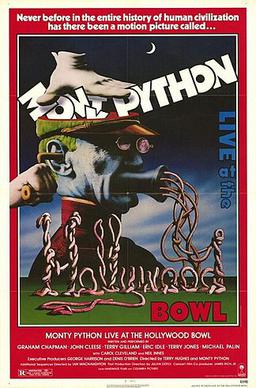
Monty Python Live at the Hollywood Bowl is a 1982 concert comedy film directed by Terry Hughes and starring the Monty Python comedy troupe as they perform many of their sketches at the Hollywood Bowl. The film also features Carol Cleveland in numerous supporting roles and Neil Innes performing songs. Also present for the shows and participating as an 'extra' was Python superfan Kim "Howard" Johnson.
"Upper Class Twit of the Year" is a comedy sketch that was seen on the 1970 Monty Python's Flying Circus episode "The Naked Ant", and also in a modified format as the finale of the movie And Now for Something Completely Different. It is notable for its satire on dimwitted members of the English upper class. Its title is a reference to the Horse of the Year Show, because equestrianism is often regarded as an upper-class pursuit in the UK.

The Fish-Slapping Dance is a comedy sketch written and performed by the Monty Python team. The sketch was originally recorded in 1971 for a pan-European May Day special titled Euroshow 71. In 1972 it was broadcast as part of episode two of series three of Monty Python's Flying Circus, which was titled "Mr & Mrs Brian Norris' Ford Popular".

Monty Python's Fliegender Zirkus are a pair of 45-minute Monty Python German television comedy specials produced by WDR for West German television. The two episodes were respectively first broadcast in January and December 1972 and were shot entirely on film and mostly on location in Bavaria, with the first episode recorded in German and the second recorded in English and then dubbed into German.

The "Four Yorkshiremen" is a comedy sketch that parodies nostalgic conversations about humble beginnings or difficult childhoods. It features four men from Yorkshire who reminisce about their upbringing. As the conversation progresses they try to outdo one another, and their accounts of deprived childhoods become increasingly absurd.
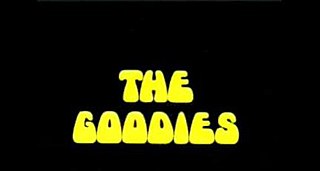
The Goodies is a British television comedy series shown in the 1970s and early 1980s. The series, which combines surreal sketches and situation comedy, was broadcast by the BBC, initially on BBC2 but soon repeated on BBC1, from 1970 to 1980. One seven-episode series was made for ITV company LWT and shown in 1981–82.

Parrot Sketch Not Included – 20 Years of Monty Python is a British television special dedicated to Monty Python, created to commemorate the 20th anniversary of the debut of the comedy group's television series, Monty Python's Flying Circus. Produced by Tiger Aspect Productions for the BBC, it was compiled by renowned British comedy producer John Lloyd and aired on BBC 1 on 18 November 1989.
"Dirty Hungarian Phrasebook" is a Monty Python sketch. It first aired in 1970 on Monty Python's Flying Circus as part of Episode 25, and also appears in the film And Now for Something Completely Different. Atlas Obscura has noted that it may have been inspired by English as She Is Spoke, a 19th-century Portuguese–English phrase book regarded as a classic source of unintentional humour, as the given English translations are generally completely incoherent.

Python Night was an evening of Monty Python-related programmes broadcast on BBC2 on 9 October 1999, to celebrate the 30th anniversary of the first broadcast of Monty Python's Flying Circus. It featured newly written sketches, three documentaries and a screening of Monty Python's Life of Brian.
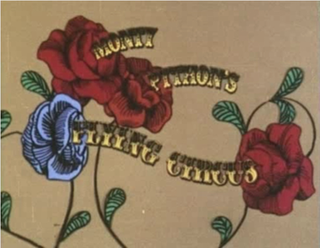
Monty Python's Flying Circus is a British surreal sketch comedy series created by and starring Graham Chapman, John Cleese, Eric Idle, Terry Jones, Michael Palin and Terry Gilliam, who became known collectively as "Monty Python", or the "Pythons". The first episode was recorded at the BBC on 7 September 1969 and premiered on 5 October on BBC1, with 45 episodes airing over four series from 1969 to 1974, plus two episodes for German TV. A feature film adaptation of several sketches, And Now for Something Completely Different, was released in 1971.
"Albatross" is a sketch from Monty Python's Flying Circus. It is particularly known for its opening lines: "Albatross! Albatross! Albatross!"

Monty Python Live (Mostly) (also billed as Monty Python Live (Mostly): One Down, Five to Go) was a variety show by the Monty Python comedy group at The O2 in London in July 2014. Planned as a single performance for 1 July, it was expanded to 10 shows due to the high demand for tickets. It was their first live performance together in 16 years, the second without member Graham Chapman (who died in 1989) and the last with Terry Jones (who died in 2020).
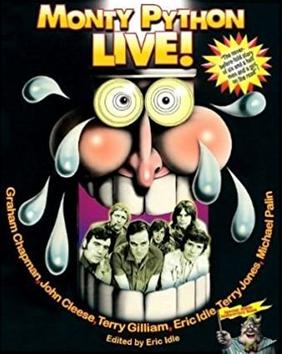
Monty Python Live! is a book detailing the various live performances of the Monty Python team between 1971 and 1980.
















